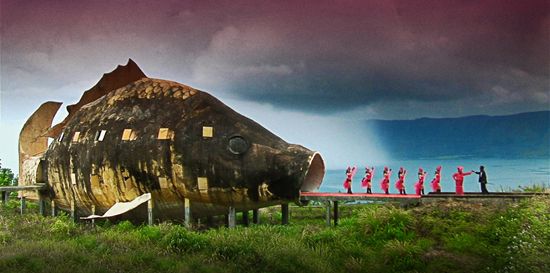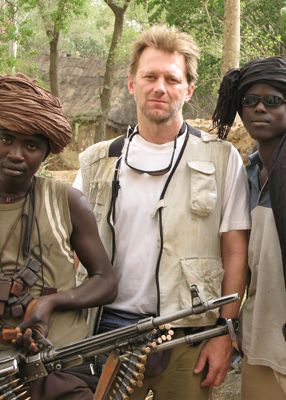The Killer Within

By Ted Braun
Joshua Oppenheimer’s landmark new documentary, The Act of Killing, accomplishes something few films have been able to do—bring viewers inside the lives of real mass murderers. “Imagine,” Oppenheimer told an audience during a conversation we had following a recent screening of the film, “that you were in Germany 40 years after the Second World War, but the Nazis had won and were still in power.” You would, he added, be in a place much like contemporary Indonesia, the setting of The Act of Killing. And you would find, as he did, people in power, who—far from being ashamed of the crimes they had committed—celebrate their killings.
Taking advantage of this openness and the impunity that the killers still enjoy, Oppenheimer was given an expansive look at how mass murders were carried out and how the perpetrators remain in power. Starting in 2004 and continuing over the next several years, he interviewed hundreds of people responsible for the 1965 genocide that helped sweep General Suharto into power. Among the many things the film accomplishes is to expose the societal fabric of state-sponsored violence— the web of relationships between state officials, media, paramilitaries, international governmental and corporate partners, people responsible for the actual slayings, citizens terrorized into acceptance of a ruling regime, and an expanding number of globalized consumers who might best be described, as Richard Nixon did about different citizens in a different time, as a great, silent majority. Viewed as a guided tour through the state apparatus of mass murder, the film is a triumph of clarity and breadth, and reveals, like nothing I’ve seen, the social network necessary to commit enormous crimes. If nothing else, the film puts to an end any notion that violence on a massive scale is solely the work of individual madmen.
Oppenheimer accomplishes this by taking us on an extraordinary journey with the film’s main character, Anwar Congo, a gangster turned death squad leader turned celebrated paramilitary officer. The film presents Anwar’s struggle to reenact for Oppenheimer’s cameras—an enterprise that includes casting victims and restaging massacres—the murders he orchestrated nearly 50 years ago. The dramatic question—like some nightmarish, hallucinatory “let’s-put-on-a-show” musical— centers on whether Anwar can produce and star in scenes of killing that will compose, to use his words, a “beautiful family movie” about his “glorious past.” The film’s inner drama, however, deliberately probes Anwar’s seemingly untroubled conscience and asks whether he’ll wake to the horror and human consequence of his actions. We hope that he, like a character in Greek tragedy, is moving inexorably toward recognition and the imaginative transformation that accompanies it. We are not disappointed.

Anyone who looks even briefly into the history of genocide and state-sponsored violence quickly becomes aware that the rhetorical and conceptual dehumanization of a targeted group are determinative steps down the path toward mass murder: Tutsis become cockroaches; Jews vermin; Native Americans dogs. But in the wake of these horrors, what happens when the time comes to deal with those responsible for the killing? If victims, other survivors, and their supporters turn around and dismiss the murderers as inhuman monsters—demonize them as something other than people—surely we run the risk of perpetuating an endless cycle of violence. One of the great and challenging aspects of The Act of Killing is its staunch refusal to dehumanize the killers who are its subject. Oppenheimer presents Anwar and his collaborators as human beings whom we can understand and with whom we can even empathize. He does this without losing a moral posture, which condemns their actions unequivocally. But the insight we gain by inhabiting the lives of Anwar and his fellow executioners, however briefly, is extraordinary. We return to our own lives with perspective—on others and on ourselves. And this may be an even greater contribution to our understanding of violence than his brilliant taxonomy of the state apparatus of genocide.
At one point in the film, Oppenheimer asks Adi Zulkadry, one of Anwar’s fellow death squad leaders, whether he considers his actions in 1965 to be war crimes. Adi is unrepentant: “‘War Crimes’ are defined by the winners. I’m a winner. So I can make my own definitions… Americans killed the Indians. Has anybody been punished for that?”
By allowing us to understand Anwar and Adi instead of dismissing them as inhuman monsters, we are invited, troubling though it may be, to see in their celebration of murder—and its almost surreal use of American cinematic genres – something of our own society and its storytelling, and to wonder about some of the most treasured parts of our national narrative. In the aftermath of Oppenheimer’s film, the games of Cowboys and Indians of many a childhood, and the ritualized drama of countless Westerns, seem not so much play-acting or good, old-fashioned entertainment but a reenactment of genocide. For provoking this profound reconsideration we owe Oppenheimer a great debt. In dancing with Anwar and watching him celebrate his murders it only seems as if we are doing something shockingly new. The Act of Killing reminds us that, in fact, we’ve been here many times before: as settlers claimed land on the plains and fought back “savages,” and as the cavalry crested the hill and charged to the rescue. This brilliant documentary invites us to reflect that from it beginnings, American film has celebrated our own acts of killing and offered them up to the world as cinematic pleasure. By prompting this startling recognition of the societal state-sponsored killer within, Joshua Oppenheimer has lit a path for Americans to imagine a way forward out of the blindness and illusions of the past.